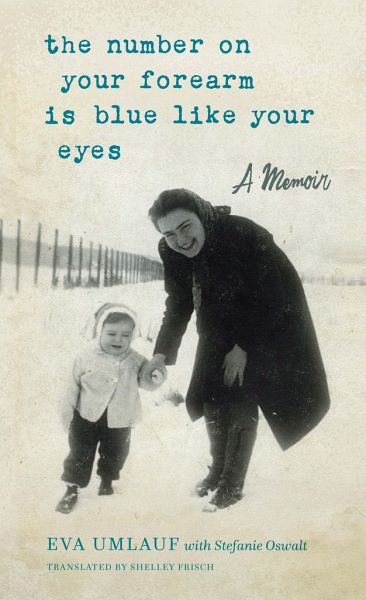
The Number on Your Forearm Is Blue Like Your Eyes
A Memoir
Übersetzer: Frisch, Shelley
Versandkostenfrei!
Versandfertig in über 4 Wochen
19,99 €
inkl. MwSt.

PAYBACK Punkte
10 °P sammeln!
Beautifully translated by Shelley Frisch, The Number on Your Forearm Is Blue Like Your Eyes is a poignant and riveting memoir that sets a family story in historical context and brings psychological insight to bear on accounts of emotional trauma. Having achieved prominence as a pediatrician, child therapist, and international speaker, Eva finally decided to tell her story. In 2016, at the age of seventy-four, with the assistance of journalist Stefanie Oswalt, Eva Umlauf published Die Nummer auf deinem Unterarm ist blau wie deine Augen: Erinnerungen (Hoffmann und Campe Verlag). As someon...
Beautifully translated by Shelley Frisch, The Number on Your Forearm Is Blue Like Your Eyes is a poignant and riveting memoir that sets a family story in historical context and brings psychological insight to bear on accounts of emotional trauma. Having achieved prominence as a pediatrician, child therapist, and international speaker, Eva finally decided to tell her story. In 2016, at the age of seventy-four, with the assistance of journalist Stefanie Oswalt, Eva Umlauf published Die Nummer auf deinem Unterarm ist blau wie deine Augen: Erinnerungen (Hoffmann und Campe Verlag). As someone who has endured the effects of the Holocaust from infancy, she writes, I wish for all that has happened to be understood and processed from diverse perspectives so that personal suffering, societal ruptures, and brutal transgenerational traumas can be prevented from being passed on to future generations.” This book draws on years of interviews, copious correspondence, archival research in Europe and Israel, trips to labor and concentration camps, and the author’s personal recollections. On November 3, 1944, a toddler named Eva, one month shy of her second birthday, was branded prisoner A-26959 in Auschwitz. She fainted in her mother’s arms but survived the tattooing and countless other shocks. Eva Hecht was born on December 19, 1942, in Novaky, Slovakia, a labor camp for Jews. Eva and her parents, Imrich and Agnes, were imprisoned in this camp until their deportation to Auschwitz. A month prior to their arrival there, several thousand mothers and their children had been gassed. Now that the Red Army was rapidly advancing in Poland, the murders stopped. Agnes, then pregnant with her second daughter, and Eva were still alive when the camp was liberated on January 27, 1945. Her father was transferred to Melk, a subcamp of the Mauthausen concentration camp, and died there in March 1945. In late April, Nora, Eva’s sister, was born. Agnes Hecht remained in the camp infirmary until her two little girls were well enough to travel, then brought them back to her home in Trenčín in western Slovakia. Eva grew up with a mother who had to “survive her survival”—the little family lived with the loss in the Holocaust of the husband/father, the mother’s three siblings, and the grandparents and great-grandparents. Having also lost her family’s fortune, Agnes worked hard to create a normal home life for her daughters. Like many survivors in the post-Holocaust era, Eva’s mother never talked about her experiences. Eva suffered frequent flare-ups of the illnesses she had suffered in Auschwitz. She did well at school and went on to study medicine in Bratislava. In 1966 she married Jakob Sultanik, a fellow Holocaust survivor who had resettled in Munich, Germany. Eva left the communist regime in Czechoslovakia in 1967 to join him in West Germany. There she began her practice as a pediatrician and later as a psychotherapist—and for the first time she had the opportunity to live out her Jewish identity. Unfortunately, Eva's husband, Jakob, died in a tragic accident when their son, Erik, was a small boy. Eva later married a fellow physician, Bernd Umlauf, and they had two sons, Oliver and Julian. Every so often, the horrors of Eva's early years would resurface in nightmares involving dead babies and Auschwitz gas chambers.












